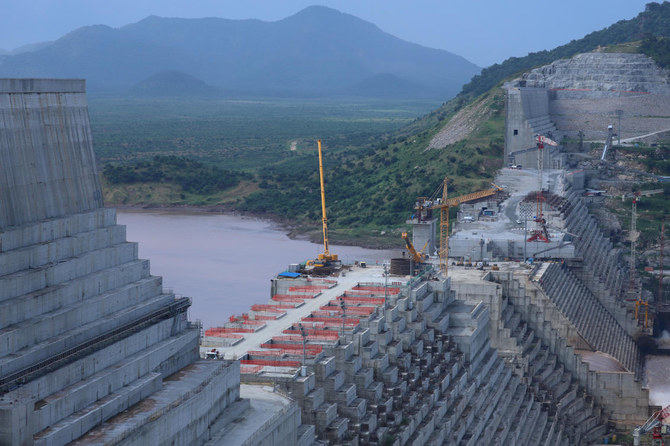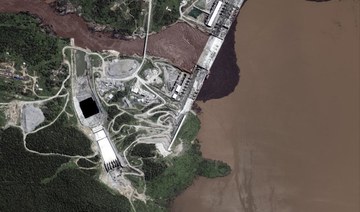CAIRO: A few days after US President Donald Trump warned that Ethiopian intransigence over the Renaissance Dam crisis could push Egypt to blow up the dam, Egypt, Ethiopia and Sudan have resumed negotiations.
The negotiations have been mediated by the African Union (AU), on the rules for filling and operating the dam, which paused two months ago due to disagreements.
Mohammed El-Sebaei, spokesman for the Egyptian Ministry of Water Resources and Irrigation, said Cairo had decided to accept the invitation of South Africa, the chair of the AU, to resume the negotiations that stalled in August, to implement the outcomes of the six-party meeting of the ministers of foreign affairs and water of the three relevant countries.
El-Sebaei added that the meeting between the representatives of the three would begin remotely to discuss the negotiation agenda. He added that Egypt wanted a solution to the issue through diplomacy, in a way that served Ethiopia’s development goals and preserved Egypt’s water rights.
South African President Cyril Ramaphosa, current chair of the AU, said the resumption of the talks demonstrated the confidence of Egypt, Ethiopia and Sudan in the union-led negotiations.
Meanwhile, the head of Sudan’s Transitional Military Council, Abdel Fattah Al-Burhan, arrived in Cairo for talks with Egyptian President Abdel Fattah El-Sisi. The two confirmed the two countries’ commitment to reaching a binding agreement regarding the filling and operation of the Renaissance Dam.
The official spokesman for the Egyptian presidency, Bassam Radi, said that the meeting between El-Sisi and Al-Burhan reviewed the developments of the Renaissance Dam in light of the current position of the tripartite negotiations between Egypt, Sudan and Ethiopia, under the auspices of the AU, where consensus was reached on the utmost importance of the water issue for the Egyptian and Sudanese peoples as a matter of national security.
The delegation accompanying Al-Burhan included 11 other members charged with holding discussions on other areas of cooperation between the two countries, including the Renaissance Dam and the normalization of ties between Sudan and Israel.
Egypt, with a population of 100 million, depends on the Nile for water for 97 percent of its irrigation and drinking water. It says it has historical rights to the river’s waters under two agreements signed in 1929 and 1959. Ethiopia has not signed these agreements and says they are invalid.
Addis Ababa signed a separate agreement, boycotted by Sudan and Egypt, in 2010 with the Nile Basin countries, allowing these countries to establish irrigation projects and construct hydroelectric dams.


























